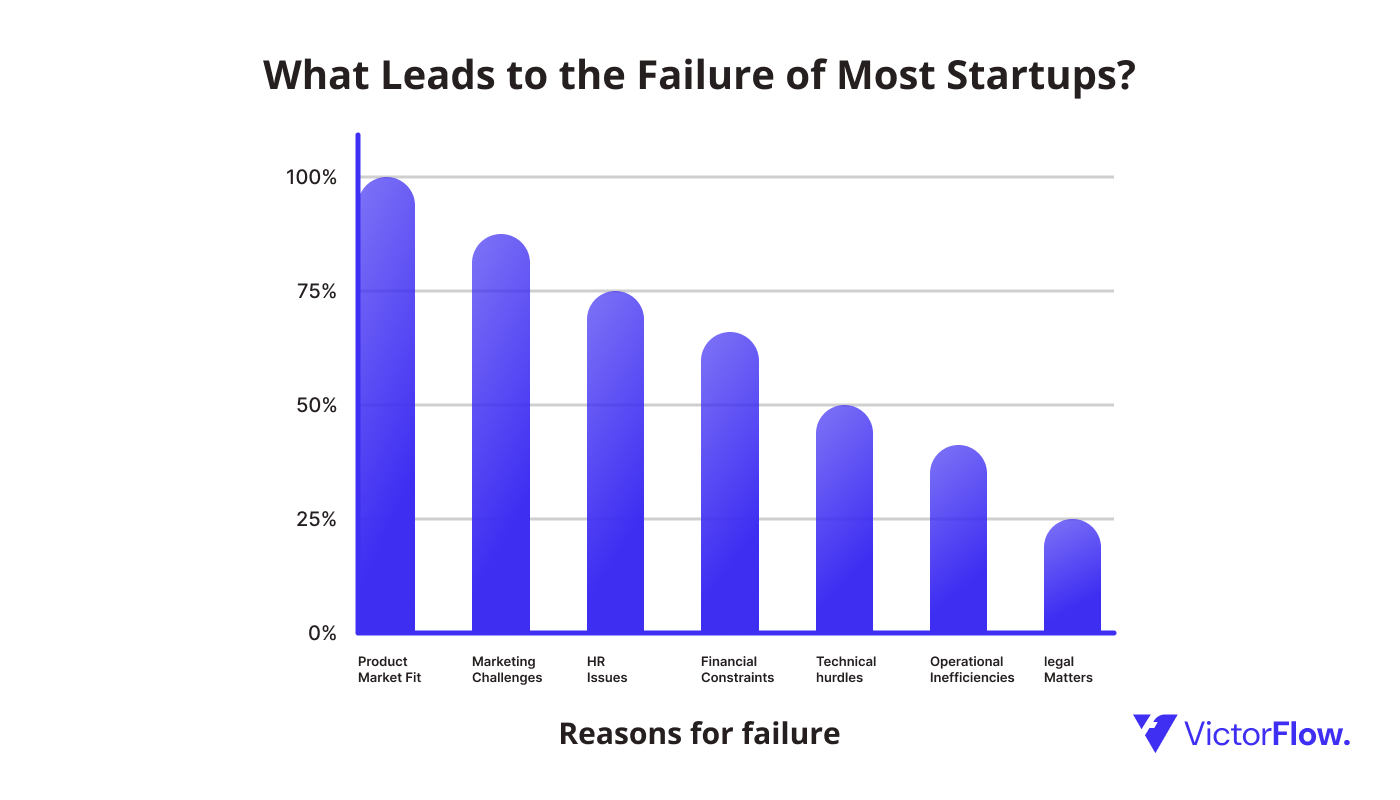Food Startup Failure: Common Pitfalls And Success Strategies

Table of Contents
Lack of a Solid Business Plan & Market Research
Many food startups stumble before they even leave the gate due to inadequate planning and market research. This often results in a mismatch between product and consumer demand, leading to wasted resources and ultimately, failure.
Underestimating Market Demand
Many food businesses launch without thoroughly researching their target market. This oversight leads to products that don't resonate with consumers, resulting in low sales and ultimately, failure.
- Insufficient market research: Failing to conduct thorough surveys and analyses to understand consumer preferences and needs.
- Ignoring competitor analysis: Overlooking the competitive landscape and failing to differentiate your offering.
- Failing to validate product-market fit: Launching a product without testing its appeal and viability with potential customers.
- Neglecting customer feedback: Ignoring valuable feedback that could help improve the product or marketing strategy.
Detail: Conduct thorough surveys, focus groups, and competitor analyses. Utilize online tools to gauge consumer sentiment. Test your Minimum Viable Product (MVP) with potential customers to gather critical feedback before significant investment. Continuously adapt your product and marketing based on this feedback. Understanding your target audience – their demographics, preferences, and purchasing habits – is paramount to avoiding food startup failure.
Poor Financial Planning & Funding
Inadequate funding and unrealistic financial projections are significant contributors to food startup failure. Even the best product will struggle to survive without a strong financial foundation.
- Underestimating startup costs: Failing to account for all initial expenses, including equipment, ingredients, marketing, and legal fees.
- Lack of contingency planning: Not having a plan to address unexpected challenges or setbacks.
- Insufficient working capital: Not having enough funds to cover operating expenses until the business becomes profitable.
- Failing to secure adequate funding: Relying solely on personal savings without exploring alternative funding options.
Detail: Develop a comprehensive business plan with detailed financial projections, including startup costs, operating expenses, and revenue forecasts. Explore diverse funding options such as small business loans, angel investors, venture capital, crowdfunding, and grants. Maintain meticulous financial records and track your cash flow diligently. Regularly review and adjust your financial plan as needed.
Operational Challenges & Inefficiencies
Even with a strong business plan and market research, operational challenges can derail a food startup. Efficient production, supply chain management, and effective marketing are crucial for long-term success.
Production & Supply Chain Issues
Difficulties in sourcing ingredients, managing inventory, and scaling production are common hurdles for food businesses. These issues can lead to inconsistent product quality, delays, and increased costs.
- Unreliable suppliers: Relying on suppliers who cannot consistently meet demands or maintain quality standards.
- Inconsistent product quality: Failing to maintain consistent quality control throughout the production process.
- Inefficient production processes: Using inefficient methods that lead to increased costs and wasted resources.
- Lack of scalability: Having production processes that cannot easily be scaled to meet growing demand.
Detail: Establish strong relationships with reliable suppliers who can consistently provide high-quality ingredients. Implement robust inventory management systems to track stock levels and prevent shortages or spoilage. Optimize production processes for efficiency and scalability, potentially through automation or technology. Invest in quality control measures to ensure consistent product quality.
Lack of Effective Marketing & Branding
A strong brand and effective marketing are essential for attracting customers and building a successful food business. Ignoring these aspects can lead to poor sales and ultimately, failure.
- Weak branding: Failing to create a unique and memorable brand identity that resonates with the target market.
- Ineffective marketing strategy: Using ineffective marketing channels or failing to reach the target audience.
- Poor online presence: Having a weak or outdated website and lack of engagement on social media.
- Lack of customer engagement: Failing to build relationships with customers and respond to their feedback.
Detail: Develop a compelling brand story that resonates with your target audience. Implement a multi-channel marketing strategy utilizing social media, email marketing, content marketing, public relations, and potentially paid advertising. Build a strong online presence with a user-friendly website and active social media profiles. Engage actively with your customers, respond to their feedback, and build a loyal customer base.
Regulatory Compliance & Food Safety
The food industry is heavily regulated, and failure to comply with food safety and legal regulations can have severe consequences.
Navigating Food Safety Regulations
Ignoring food safety regulations can lead to serious consequences, including legal penalties, product recalls, and irreparable damage to your brand reputation.
- Lack of understanding of food safety regulations: Not being aware of all applicable regulations at local, state, and federal levels.
- Inadequate food handling practices: Failing to implement proper food handling and storage procedures to prevent contamination.
- Insufficient safety training for staff: Not providing adequate training to employees on food safety procedures and hygiene practices.
- Failure to obtain necessary licenses and permits: Operating without the required licenses and permits.
Detail: Thoroughly research and understand all relevant food safety regulations. Implement rigorous food safety protocols and procedures throughout your operations. Provide comprehensive training to all staff on food safety and hygiene practices. Obtain all necessary licenses and permits before starting your business.
Legal & Permits Hurdles
Beyond food safety, navigating various legal and permitting requirements is crucial. Overlooking these can lead to substantial fines and even business closure.
- Neglecting licensing requirements: Failing to obtain all necessary business licenses and permits.
- Inadequate insurance coverage: Not having sufficient insurance to protect your business from potential liabilities.
- Failing to comply with labeling regulations: Not adhering to regulations related to food labeling and ingredient information.
- Overlooking intellectual property protection: Not protecting your brand name, recipes, and other intellectual property.
Detail: Consult with legal professionals specializing in food and beverage businesses to ensure full compliance with all relevant regulations. Secure adequate insurance coverage to protect your business from potential risks and liabilities. Ensure all your food labeling practices comply with regulations. Protect your valuable intellectual property through trademarks and copyrights.
Conclusion
Avoiding food startup failure requires meticulous planning, adaptability, and a deep understanding of the industry. By carefully considering the common pitfalls outlined above and implementing the suggested strategies, entrepreneurs can significantly increase their chances of success. Building a successful food business requires a strong business plan, efficient operations, a compelling brand, and strict adherence to food safety and legal regulations. Don't let your food startup fall victim to common pitfalls – learn from others' mistakes and build a thriving business. Start planning your successful food venture today by creating a solid Food Startup Plan and conducting thorough market research.

Featured Posts
-
 Rekordarak A Vateran Ime A Legertekesebb Aukcios Tetelek
May 29, 2025
Rekordarak A Vateran Ime A Legertekesebb Aukcios Tetelek
May 29, 2025 -
 Venloer Strasse In Koeln Einbahnstrassen Regelung Bleibt Bestehen
May 29, 2025
Venloer Strasse In Koeln Einbahnstrassen Regelung Bleibt Bestehen
May 29, 2025 -
 Choosing The Best Office Chair In 2025 A Buyers Guide
May 29, 2025
Choosing The Best Office Chair In 2025 A Buyers Guide
May 29, 2025 -
 50 Jarige Man Overleden Na Schietincident In Venlo
May 29, 2025
50 Jarige Man Overleden Na Schietincident In Venlo
May 29, 2025 -
 Fatal January Shooting In Seattle Park Second Arrest
May 29, 2025
Fatal January Shooting In Seattle Park Second Arrest
May 29, 2025
